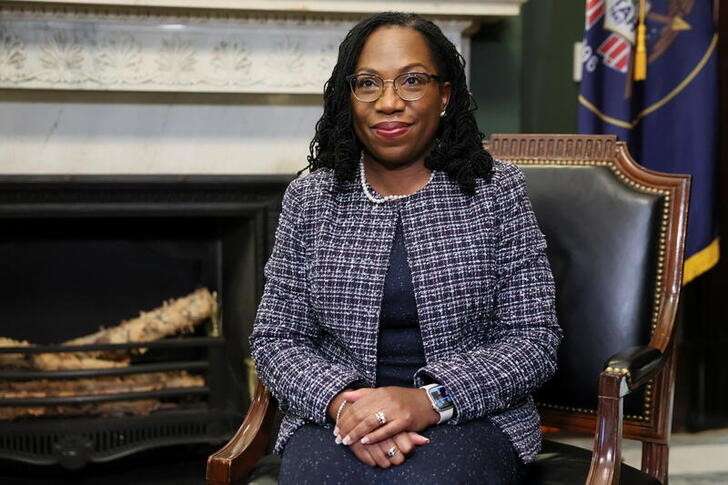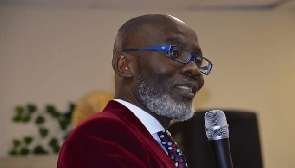Supreme Court nominee, Ketanji Brown Jackson, has pledged to decide cases “without fear or favour” if the Senate confirms her historic nomination as the first Black-American woman on the high court.
Jackson, 51, thanked God and professed love for “our country and the Constitution” in a 12-minute statement to the Senate Judiciary Committee at the end of her first day of the confirmation hearing. The hearing which took nearly four hours was almost entirely consumed by remarks from the panel’s 22 members.
Republicans promised hard-hitting questions over the coming two days, with a special focus on her record on criminal matters. Democrats on the other hand are full of praise for President Joe Biden’s Supreme Court nominee.
With her family sitting behind her, Jackson stressed that she has been independent, deciding cases “from a neutral posture” in her nine years as a judge and that she is ever mindful of the importance of that role.
“I have dedicated my career to ensuring that the words engraved on the front of the Supreme Court building, equal justice under law, are a reality and not just an ideal.”
Supreme Court nominee, Ketanji Brown Jackson
Barring a significant misstep, Democrats, who control the Senate by the slimmest of margins intend to wrap up her confirmation before Easter. This will make Jackson the third Black justice, after Thurgood Marshall and Clarence Thomas, as well as the first Black-American woman on the high court.
Jackson’s sternest Republican critics as well as her Democratic defenders all acknowledged the historic, barrier-breaking nature of her presence. There were frequent reminders that no Black-American woman was ever nominated to the high court before her and repeated references to another unique aspect of her nomination: Jackson is the first former public defender nominated to be a justice.
“It’s not easy being the first. Often, you have to be the best, in some ways the bravest,” Democratic Senator, Dick Durbin of Illinois, the Committee Chairman, said in support.
Democrats sought to preemptively rebut Republican criticisms of her record on criminal matters as a judge, as a federal public defender and as a member of the US Sentencing Commission.
Jackson “is not anti-law enforcement,” and is not “soft on crime,” Senator Pat Leahy D-Vt., said, claiming that Jackson has support from some national law enforcement organizations. “Judge Jackson is no judicial activist”, Senator Leahy added.
The committee’s senior Republican, Senator Chuck Grassley of Iowa, promised Republicans would “ask tough questions about Jackson’s judicial philosophy,” without turning the hearings into a ”spectacle.”
Senator Lindsey Graham, R-S.C., disclosed that Democrats opposed some past Republican judicial nominees who were Black or Hispanic, and he said that he and his GOP colleagues wouldn’t be deterred by Jackson’s race from asking probing questions. He noted that some criticism from the left will not be a bother since “It’s about…, ‘We’re all racist if we ask hard questions.’ That’s not going to fly with us.”
Graham was one of three Republicans to support Jackson’s confirmation, 53-44, as an appellate judge last year. But he indicated over the past several weeks that he is unlikely to vote for her again.
While most Republicans are not likely to vote for her, most GOP senators did not aggressively criticize Jackson, whose confirmation would not change the court’s 6-3 conservative majority. Several Republicans used their time to denounce Senate Democrats instead of Jackson’s record.
The Republicans are trying to use her nomination to brand Democrats as soft on crime, an emerging theme in GOP midterm election campaigns. Biden has chosen several former public defenders for life-tenured judicial posts. In addition, Jackson served on the US Sentencing Commission, an independent agency created by Congress to reduce disparity in federal prison sentences.
With Jackson silently taking notes, Sen. Josh Hawley, R-Mo., said in his opening statement that his research showed that she had a pattern of issuing lower sentences in child pornography cases, repeating comments he wrote in a Twitter thread last week. The Republican National Committee echoed his claims, which Hawley did not raise when he questioned Jackson last year before voting against her appeals court confirmation.
The White House, along with several Democrats at the hearing, rejected Hawley’s criticism as “toxic and weakly presented misinformation.”
Former Alabama Senator, Doug Jones, who is guiding Jackson as she navigates the Senate process, told reporters afterwards that “she will be the one to counter many of those questions” from Hawley and others on Tuesday, March 22, 2022, and Wednesday, March 23, 2022.
Hawley is one of several committee Republicans, along with Ted Cruz of Texas and Tom Cotton of Arkansas, who are potential 2024 presidential candidates, whose aspirations may collide with other Republicans who would prefer not to pursue a scorched-earth approach to Jackson’s nomination.
Jackson’s testimony will give most Americans, as well as the Senate, their most extensive look yet, at the Harvard-trained lawyer with a broader resume than many nominees. She would be the first justice with significant criminal defence experience since Marshall. She appeared before the same committee last year (2021), after Biden chose her to fill an opening on the federal Appeals Court in Washington, just down the hill from the Supreme Court.
The American Bar Association (ABA), which evaluates judicial nominees, has given her its highest rating as“well qualified.”
President Biden chose Jackson in February 2022, in fulfilment of a campaign pledge to nominate a Black woman to the Supreme Court for the first time in American history. She would take the seat of Justice Stephen Breyer, who announced in January 2022, that he would retire after 28 years on the court.
Jackson once worked as a law clerk to Breyer early in her legal career. She had special praise for her former boss, saying she could never fill his shoes. “But if confirmed, I would hope to carry on his spirit,” Jackson said.
She also expressed her thanks and love to her husband, Patrick Jackson, a surgeon in Washington, their two daughters; one in college and the other in high school, who sat in the audience beside him. Her parents and in-laws also were in attendance.
READ ALSO: Government Should’ve Listened To Prevent Economic Hardship- Professor Kwesi Prempeh



















